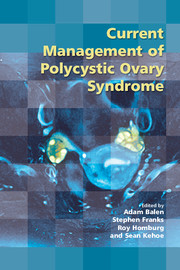Book contents
- Frontmatter
- Contents
- Participants
- Declarations of personal interest
- Preface
- 1 Overview and definitions of polycystic ovary syndrome and the polycystic ovary
- 2 Genetics and pathogenesis of polycystic ovary syndrome
- 3 Ethnic variations in the expression of polycystic ovary syndrome
- 4 Quality of life for women with polycystic ovary syndrome
- 5 Insulin resistance, the metabolic syndrome and polycystic ovary syndrome
- 6 Management of polycystic ovary syndrome through puberty and adolescence
- 7 Long-term health risks of polycystic ovary syndrome
- 8 Approaches to lifestyle management in polycystic ovary syndrome
- 9 Management of obesity in polycystic ovary syndrome, including anti-obesity drugs and bariatric surgery
- 10 Definition of hyperandrogenism
- 11 Treatment of hyperandrogenism in polycystic ovary syndrome
- 12 Choices in the treatment of anovulatory polycystic ovary syndrome
- 13 Predictors of ovarian response to ovarian stimulation: progress towards individualised treatment in ovulation induction
- 14 Surgical management of anovulatory infertility in polycystic ovary syndrome
- 15 The role of insulin-sensitising drugs in the treatment of polycystic ovary syndrome
- 16 The role of in vitro maturation of oocytes for anovulatory polycystic ovary syndrome
- 17 Acupuncture and/or herbal therapy as an alternative or complement for relief of polycystic ovary syndrome-related symptoms
- 18 Consensus views arising from the 59th Study Group: Current Management of Polycystic Ovary Syndrome
- Index
3 - Ethnic variations in the expression of polycystic ovary syndrome
Published online by Cambridge University Press: 05 July 2014
- Frontmatter
- Contents
- Participants
- Declarations of personal interest
- Preface
- 1 Overview and definitions of polycystic ovary syndrome and the polycystic ovary
- 2 Genetics and pathogenesis of polycystic ovary syndrome
- 3 Ethnic variations in the expression of polycystic ovary syndrome
- 4 Quality of life for women with polycystic ovary syndrome
- 5 Insulin resistance, the metabolic syndrome and polycystic ovary syndrome
- 6 Management of polycystic ovary syndrome through puberty and adolescence
- 7 Long-term health risks of polycystic ovary syndrome
- 8 Approaches to lifestyle management in polycystic ovary syndrome
- 9 Management of obesity in polycystic ovary syndrome, including anti-obesity drugs and bariatric surgery
- 10 Definition of hyperandrogenism
- 11 Treatment of hyperandrogenism in polycystic ovary syndrome
- 12 Choices in the treatment of anovulatory polycystic ovary syndrome
- 13 Predictors of ovarian response to ovarian stimulation: progress towards individualised treatment in ovulation induction
- 14 Surgical management of anovulatory infertility in polycystic ovary syndrome
- 15 The role of insulin-sensitising drugs in the treatment of polycystic ovary syndrome
- 16 The role of in vitro maturation of oocytes for anovulatory polycystic ovary syndrome
- 17 Acupuncture and/or herbal therapy as an alternative or complement for relief of polycystic ovary syndrome-related symptoms
- 18 Consensus views arising from the 59th Study Group: Current Management of Polycystic Ovary Syndrome
- Index
Summary
Introduction
Polycystic ovary syndrome (PCOS) is the most common endocrine problem affecting women of reproductive age and is reported from many regions of the world. Some reports indicate ethnic differences in its manifestation. This chapter examines the evidence for ethnic variation in the PCOS phenotype and explores the possible basis of this phenomenon.
Despite having a relatively recent ancestry, the species of modern Homo sapiens sapiens is a non-homogeneous group, as is evident from their differing physical, behavioural and social characteristics. Such variation has the potential to affect the prevalence and presentation of common diseases. Every human being has a unique inherited (genetic) make-up that can be affected by many environmental (non-genetic) influences during life that can modify external features and manifestations. Spielman et al. demonstrated that the expression of some genes differs significantly among different ethnic groups. Phenotypic variations in human populations may be caused by natural selection and adaptation to environmental conditions. Recent genome-wide studies have identified a few loci that contribute to differentiation of disease-related phenotypic diversity.
Researchers studying PCOS in depth need to decipher any ethnic variations of its genotype and phenotype. This requires sound epidemiological evidence that can characterise risks, both at an individual and a population level, to enable effective planning of prevention and treatment strategies. Such an analysis must also consider variations in normal traits, risk factors for comorbidities, response to treatment and effects of pharmacological agents.
Keywords
- Type
- Chapter
- Information
- Current Management of Polycystic Ovary Syndrome , pp. 25 - 46Publisher: Cambridge University PressPrint publication year: 2010
- 2
- Cited by

